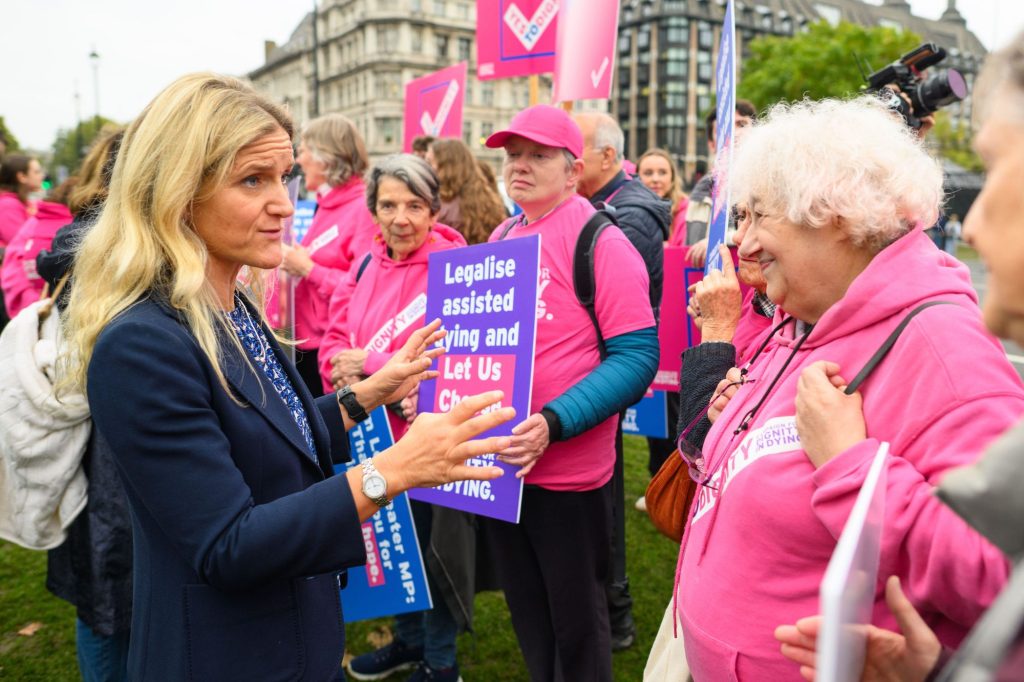
2YAX3HR London, UK. 16 October 2024. MP Kim Leadbeater joins campaigners in favour of legalising assisted dying outside parliament, as the First Reading of the assisted dying bill takes place. Photo credit should read: Matt Crossick/Empics/Alamy Live News
As the debate on the legalisation of assisted dying inches closer, the staff of MPs backing the initiative ramp up efforts to gauge parliamentary opinion. In an attempt to build momentum and insight ahead of the imminent vote, PoliticsHome has reported that these staff members have initiated a canvassing operation within the hallowed halls of Parliament. This strategic move coincides with Kim Leadbeater’s Terminally Ill Adults (End of Life) Bill, which has already cleared a significant hurdle in the House of Commons in November, securing a majority of 55 votes.
A Legislation Driven by Conscience
The controversial bill, seeking to provide terminally ill adults — those with a life expectancy of six months or less — the option for assisted suicide, treads the delicate line of moral and ethical debate. Important to note is that votes on such legislation are treated as matters of conscience; thus, individual MPs are not subject to party whips, marking a departure from conventional parliamentary voting practices.
As preparations for the forthcoming debate move forward, scheduled for 16 May, Leadbeater has proactively engaged with MPs across the board. She penned a letter to elicit more time for reviewing amendments made in committee, hoping that this grant of time will allow all members and the Welsh government to examine the intricacies of the revised bill structure. Moreover, she candidly shared that the impact assessment for the bill remains unavailable, hence the necessity for MPs to deliberate on its findings ahead of the Report Stage.
Engagement and Concerns within Parliament
Pursuing a highly proactive approach, MPs’ staffers have been sent to conduct door-to-door engagements, aiming to ascertain voting intentions and delve into discussions with sceptics. This pre-recess activity was specifically tailored to garner comprehensive input on the matter. Adjustments during the Committee Stage saw the removal of a safeguard requiring a High Court judge’s approval for assisted death applications, replaced by a panel of three members — a psychiatrist, a social worker, and a lawyer. While Leadbeater argues that these committee amendments significantly bolster the legislation, detractors worry that the absence of a judge’s oversight reneges on prior assurances.
Reflecting the divided sentiments in parliament, some MPs backing the bill express apprehension about the narrow margin achieved during the Second Reading, fearing potential no-switch votes could imperil the bill’s passage. Contrarily, Leadbeater’s camp remains optimistic, dismissing claims that they are jittery over the bill’s progression at the Third Reading.
Anticipated Changes and Public Stances
While some parliamentarians remain equivocal on their vote, Reform UK’s Lee Anderson and Rupert Lowe have distinctly conveyed their shift from a ‘yes’ to a ‘no’. Health Secretary Wes Streeting, despite maintaining a critical stance on the bill, praised Leadbeater’s constructive engagement strategy but reiterated his decision to vote against it, setting the stage for impassioned exchanges during the legislative process.
As the vote draws near, the campaign for assisted dying highlights a broader conversation on moral judgment, compassion, and legislative responsibility. As contentious as the subject may be, it undeniably sheds light on the complexity of law-making in matters intimately tied to human dignity and choice.



